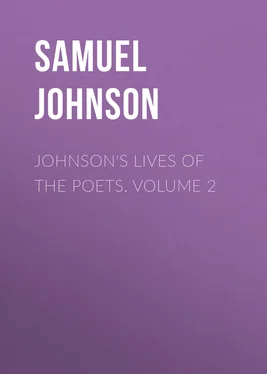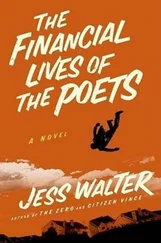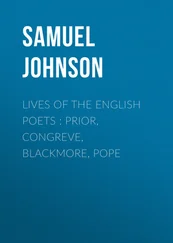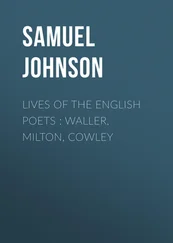Samuel Johnson - Johnson's Lives of the Poets. Volume 2
Здесь есть возможность читать онлайн «Samuel Johnson - Johnson's Lives of the Poets. Volume 2» — ознакомительный отрывок электронной книги совершенно бесплатно, а после прочтения отрывка купить полную версию. В некоторых случаях можно слушать аудио, скачать через торрент в формате fb2 и присутствует краткое содержание. Издательство: Иностранный паблик, Жанр: foreign_poetry, literature_18, Поэзия, foreign_antique, foreign_prose, на английском языке. Описание произведения, (предисловие) а так же отзывы посетителей доступны на портале библиотеки ЛибКат.
- Название:Johnson's Lives of the Poets. Volume 2
- Автор:
- Издательство:Иностранный паблик
- Жанр:
- Год:неизвестен
- ISBN:нет данных
- Рейтинг книги:5 / 5. Голосов: 1
-
Избранное:Добавить в избранное
- Отзывы:
-
Ваша оценка:
- 100
- 1
- 2
- 3
- 4
- 5
Johnson's Lives of the Poets. Volume 2: краткое содержание, описание и аннотация
Предлагаем к чтению аннотацию, описание, краткое содержание или предисловие (зависит от того, что написал сам автор книги «Johnson's Lives of the Poets. Volume 2»). Если вы не нашли необходимую информацию о книге — напишите в комментариях, мы постараемся отыскать её.
Johnson's Lives of the Poets. Volume 2 — читать онлайн ознакомительный отрывок
Ниже представлен текст книги, разбитый по страницам. Система сохранения места последней прочитанной страницы, позволяет с удобством читать онлайн бесплатно книгу «Johnson's Lives of the Poets. Volume 2», без необходимости каждый раз заново искать на чём Вы остановились. Поставьте закладку, и сможете в любой момент перейти на страницу, на которой закончили чтение.
Интервал:
Закладка:
His first performance, the Rural Sports, is such as was easily planned and executed; it is never contemptible, nor ever excellent. The Fan is one of those mythological fictions which antiquity delivers ready to the hand, but which, like other things that lie open to every one's use, are of little value. The attention naturally retires from a new tale of Venus, Diana, and Minerva.
His "Fables" seem to have been a favourite work; for, having published one volume, he left another behind him. Of this kind of Fables the author does not appear to have formed any distinct or settled notion. Phaedrus evidently confounds them with Tales, and Gay both with Tales and Allegorical Prosopopoeias. A Fable or Apologue, such as is now under consideration, seems to be, in its genuine state, a narrative in which beings irrational, and sometimes inanimate, arbores loquuntur, non tantum ferae, are, for the purpose of moral instruction, feigned to act and speak with human interests and passions. To this description the compositions of Gay do not always conform. For a fable he gives now and then a tale, or an abstracted allegory; and from some, by whatever name they may be called, it will be difficult to extract any moral principle. They are, however, told with liveliness, the versification is smooth, and the diction, though now and then a little constrained by the measure or the rhyme, is generally happy.
To "Trivia" may be allowed all that it claims; it is sprightly, various, and pleasant. The subject is of that kind which Gay was by nature qualified to adorn, yet some of his decorations may be justly wished away. An honest blacksmith might have done for Patty what is performed by Vulcan. The appearance of Cloacina is nauseous and superfluous; a shoe-boy could have been produced by the casual cohabitation of mere mortals. Horace's rule is broken in both cases; there is no dignus vindice nodus, no difficulty that required any supernatural interposition. A patten may be made by the hammer of a mortal, and a bastard may be dropped by a human strumpet. On great occasions, and on small, the mind is repelled by useless and apparent falsehood.
Of his little poems the public judgment seems to be right; they are neither much esteemed nor totally despised. The story of "The Apparition" is borrowed from one of the tales of Poggio. Those that please least are the pieces to which Gulliver gave occasion, for who can much delight in the echo of an unnatural fiction?
"Dione" is a counterpart to "Amynta" and "Pastor Fido" and other trifles of the same kind, easily imitated, and unworthy of imitation. What the Italians call comedies from a happy conclusion, Gay calls a tragedy from a mournful event, but the style of the Italians and of Gay is equally tragical. There is something in the poetical Arcadia so remote from known reality and speculative possibility that we can never support its representation through a long work. A pastoral of an hundred lines may be endured, but who will hear of sheep and goats, and myrtle bowers and purling rivulets, through five acts? Such scenes please barbarians in the dawn of literature, and children in the dawn of life, but will be for the most part thrown away as men grow wise and nations grow learned.
TICKELL
Thomas Tickell, the son of the Rev. Richard Tickell, was born in 1686, at Bridekirk, in Cumberland, and in 1701 became a member of Queen's College in Oxford; in 1708 he was made Master of Arts, and two years afterwards was chosen Fellow, for which, as he did not comply with the statutes by taking orders, he obtained a dispensation from the Crown. He held his fellowship till 1726, and then vacated it by marrying, in that year, at Dublin.
Tickell was not one of those scholars who wear away their lives in closets; he entered early into the world and was long busy in public affairs, in which he was initiated under the patronage of Addison, whose notice he is said to have gained by his verses in praise of Rosamond. To those verses it would not have been just to deny regard, for they contain some of the most elegant encomiastic strains; and among the innumerable poems of the same kind it will be hard to find one with which they need to fear a comparison. It may deserve observation that when Pope wrote long afterwards in praise of Addison, he has copied—at least, has resembled—Tickell.
"Let joy salute fair Rosamonda's shade,
And wreaths of myrtle crown the lovely maid.
While now perhaps with Dido's ghost she roves,
And hears and tells the story of their loves,
Alike they mourn, alike they bless their fate,
Since Love, which made them wretched, made them great.
Nor longer that relentless doom bemoan,
Which gained a Virgil and an Addison."—TICKELL.
"Then future ages with delight shall see
How Plato's, Bacon's, Newton's, looks agree;
Or in fair series laurelled bards be shown,
A Virgil there, and here an Addison."—POPE.
He produced another piece of the same kind at the appearance of Cato, with equal skill, but not equal happiness.
When the Ministers of Queen Anne were negotiating with France, Tickell published "The Prospect of Peace," a poem of which the tendency was to reclaim the nation from the pride of conquest to the pleasures of tranquillity. How far Tickell, whom Swift afterwards mentioned as Whiggissimus, had then connected himself with any party, I know not; this poem certainly did not flatter the practices, or promote the opinions, of the men by whom he was afterwards befriended.
Mr. Addison, however he hated the men then in power, suffered his friendship to prevail over his public spirit, and gave in the Spectator such praises of Tickell's poem that when, after having long wished to peruse it, I laid hold of it at last, I thought it unequal to the honours which it had received, and found it a piece to be approved rather than admired. But the hope excited by a work of genius, being general and indefinite, is rarely gratified. It was read at that with so much favour that six editions were sold.
At the arrival of King George, he sang "The Royal Progress," which, being inserted in the Spectator, is well known, and of which it is just to say that it is neither high nor low.
The poetical incident of most importance in Tickell's life was his publication of the first book of the "Iliad," as translated by himself, an apparent opposition to Pope's "Homer," of which the first part made its entrance into the world at the same time. Addison declared that the rival versions were both good, but that Tickell's was the best that ever was made; and with Addison, the wits, his adherents and followers, were certain to concur. Pope does not appear to have been much dismayed, "for," says he, "I have the town—that is, the mob—on my side." But he remarks "that it is common for the smaller party to make up in diligence what they want in numbers. He appeals to the people as his proper judges, and if they are not inclined to condemn him, he is in little care about the highflyers at Button's."
Pope did not long think Addison an impartial judge, for he considered him as the writer of Tickell's version. The reasons for his suspicion I will literally transcribe from Mr. Spence's Collection:—
"There had been a coldness," said Mr. Pope, "between Mr. Addison and me for some time, and we had not been in company together, for a good while, anywhere but at Button's Coffee House, where I used to see him almost every day. On his meeting me there, one day in particular, he took me aside and said he should be glad to dine with me at such a tavern, if I stayed till those people were gone (Budgell and Philips). He went accordingly, and after dinner Mr. Addison said 'that he had wanted for some time to talk with me: that his friend Tickell had formerly, whilst at Oxford, translated the first book of the Iliad; that he designed to print it, and had desired him to look it over; that he must therefore beg that I would not desire him to look over my first book, because, if he did, it would have the air of double-dealing.' I assured him that I did not at all take it ill of Mr. Tickell that he was going to publish his translation; that he certainly had as much right to translate any author as myself; and that publishing both was entering on a fair stage. I then added that I would not desire him to look over my first book of the Iliad, because he had looked over Mr. Tickell's, but could wish to have the benefit of his observations on my second, which I had then finished, and which Mr. Tickell had not touched upon. Accordingly I sent him the second book the next morning, and Mr. Addison a few days after returned it, with very high commendations. Soon after it was generally known that Mr. Tickell was publishing the first book of the Iliad, I met Dr. Young in the street, and upon our falling into that subject, the doctor expressed a great deal of surprise at Tickell's having had such a translation so long by him. He said that it was inconceivable to him, and that there must be some mistake in the matter; that each used to communicate to the other whatever verses they wrote, even to the least things; that Tickell could not have been busied in so long a work there without his knowing something of the matter; and that he had never heard a single word of it till on this occasion. This surprise of Dr. Young, together with what Steele has said against Tickell in relation to this affair, make it highly probable that there was some underhand dealing in that business; and indeed Tickell himself, who is a very fair worthy man, has since, in a manner, as good as owned it to me. When it was introduced into a conversation between Mr. Tickell and Mr. Pope by a third person, Tickell did not deny it, which, considering his honour and zeal for his departed friend, was the same as owning it."
Читать дальшеИнтервал:
Закладка:
Похожие книги на «Johnson's Lives of the Poets. Volume 2»
Представляем Вашему вниманию похожие книги на «Johnson's Lives of the Poets. Volume 2» списком для выбора. Мы отобрали схожую по названию и смыслу литературу в надежде предоставить читателям больше вариантов отыскать новые, интересные, ещё непрочитанные произведения.
Обсуждение, отзывы о книге «Johnson's Lives of the Poets. Volume 2» и просто собственные мнения читателей. Оставьте ваши комментарии, напишите, что Вы думаете о произведении, его смысле или главных героях. Укажите что конкретно понравилось, а что нет, и почему Вы так считаете.












